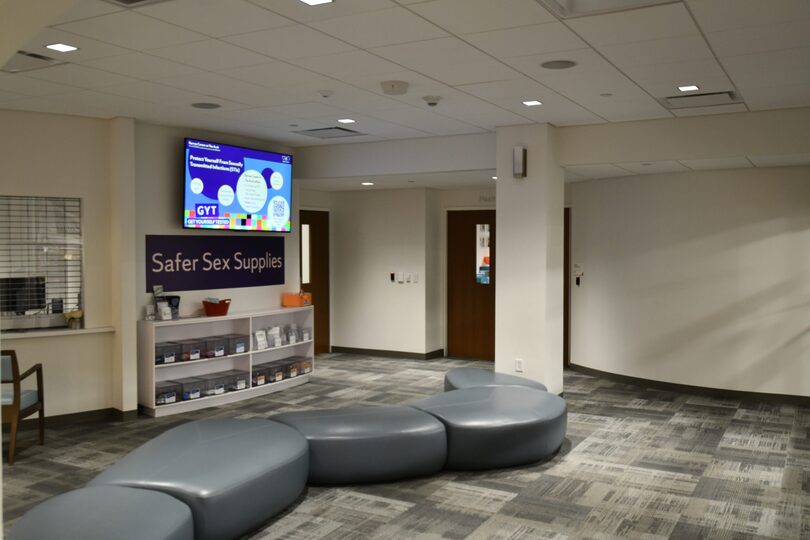Expanded SUNY Upstate education program teaches HPV-related cancer prevention

Upstate University Hospital's "beneath the surFACE" program was created in 2016 as a cancer prevention education initiative targeting students in central New York. Now, the program's goal is for students to be aware and educated on health issues related to STIs. Zabdyl Koffa | Staff Photographer
Get the latest Syracuse news delivered right to your inbox.
Subscribe to our newsletter here.
Martha Ryan and her team of interns at beneath the surFACE have noticed widespread confusion regarding STIs and vaccinations. To counter this, they continue to empower college students to make informed healthcare decisions.
Upstate University Hospital’s Cancer Center’s beneath the surFACE program is partnering with Syracuse University to promote vaccine clinics and spread HPV awareness across campus. The program is a partnership with SU’s public health program, which is currently housed in the Maxwell School of Citizenship and Public Affairs, according to its website.
The program, which began in 2016 for cancer prevention education, initially targeted middle and high school students in the central New York area. It expanded to college-aged students in 2022 as part of its attempt to increase vaccination rates, Ryan – program coordinator for beneath the surFACE – said.
Ryan said vaccination rates among college-aged students are “extremely low.” Based on her decades of experience in public health, Ryan said that unequal access to health literacy prevents people from receiving education on HPV.
“What I say to people making those decisions is that ‘I am simply providing you with that information,’” Ryan said. “And hopefully they use it in a wise way.”
There are two types of HPV: non-oncogenic, which causes warts, and oncogenic, which causes cancer. Around nine of 10 HPV infections go away within two years, though sometimes it lasts longer.
HPV can develop into one of six different types of cancer, including cervical, head and neck, vaginal, vulvar, penile or anal, according to the National Cancer Institute.
The Gardasil 9 vaccine is available for students to receive at the Barnes Center at the Arch on clinic days or at Nappi Pharmacy at Upstate with no appointment needed. The vaccine has the potential to prevent 90% of cancers caused by HPV, according to the CDC.
Mia Merola and Osayamen Igbinedion, two SU seniors studying public health, are interning with Ryan. They’ve tabled for awareness across campus, creating infographics and hosting classroom presentations for their peers in the public health program.
Their presentations have two goals — to make sure college students know their HPV vaccination status and how to check it and to let students know how to get vaccinated if they’re not already, Merola said.
“Just knowing that people are eager to learn, makes me hopeful, and knowing that people are willing to listen helps us promote the vaccine which is such an important cause,” Igbinedion said.
Merola said she became connected to the internship through a classroom presentation from one of Ryan’s old interns her freshman year.
“Even as a public health student, I did not know much about HPV,” she said, “I think what was best for me was hearing the statistics, hearing the facts and so that is what I present my peers with.”
HPV is the most common sexually transmitted infection, according to Planned Parenthood. Around eight in 10 people in their lifetime — roughly 14 million people every year — will contract HPV, which is typically spread through skin-to-skin contact, according to the Cleveland Clinic.
Ryan, who’s been working with SU students for the past five years, said the biggest obstacle students face is being unfamiliar with thinking about their own health.
“Our goal is to empower them,” Ryan said. “College students need to be aware and educated on their own health in order to make intelligent decisions.”
Ryan said the anti-vax movement is also a big obstacle. Controversy surrounding COVID-19 vaccinations has had a “runoff effect” on other vaccines, she said.
Lisa Olson-Gugerty, a public health professor at SU, said the vaccine’s promotion may be an issue, too.
“One of the things that the vaccine did not do best in terms of social context. They promoted it as a way to prevent your child from getting a sexual disease instead of preventing your child from getting cancer,” Olson-Gugerty said. “And that just added to the stigma.”
Olson-Gugerty has had beneath the surFACE interns present in her public health care classes since the program started and said her students have always seemed to understand the relationship between HPV and cancer.
Merola noticed confusion in her peers when discussing HPV because of misinformation regarding the disease.
“My peers often do not know much about HPV, and when they know the information it is usually incorrect,” Merola said. “But in my experience, they have always been willing to listen and reaching new audiences will always pay off.”





